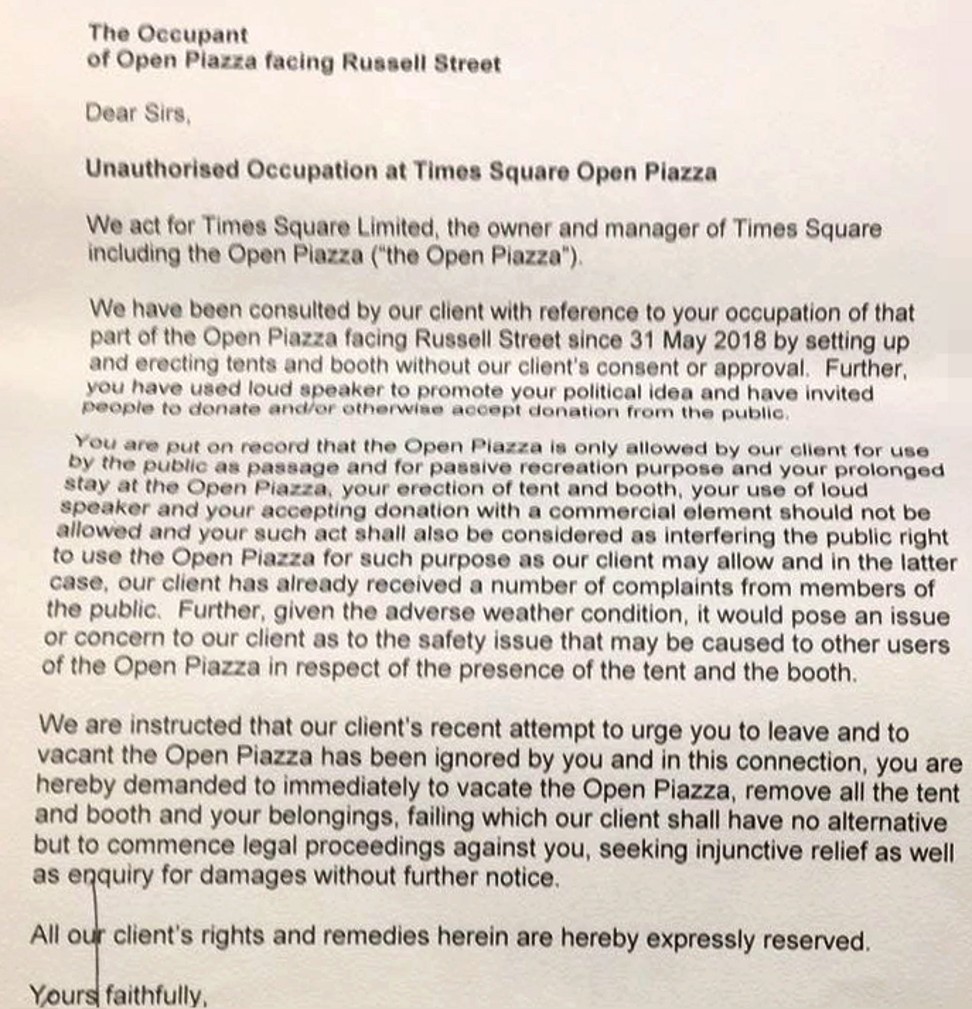
Activists who erected exhibition for late Chinese dissident Liu Xiaobo told to leave Hong Kong’s Times Square
Times Square said it would commence legal proceedings against the group if bust of Liu and accompanying exhibition is not removed from site ‘immediately’
Activists staging a tribute for the late Chinese pro-democracy icon Liu Xiaobo for the past two weeks have been told to leave the grounds of a popular Hong Kong shopping centre for “unauthorised occupation”, according to lawyers for the building’s owner.
“At first, they sent me a letter saying that we should take our tents down for public safety reasons because of the typhoon this week, the next day they suddenly sent us this letter asking us to leave,” Tsang said.
Wife of Chinese dissident Liu Xiaobo ‘feels like she is serving a life sentence’ for ‘crime’ of loving Nobel Peace Prize winner
According to a copy of the letter seen by the Post, the lawyers said the group did not ask for consent to use the site and said they had violated rules by using loud speakers to promote their political ideas and soliciting donations from the public.
“Such acts shall also be considered as interfering with the public right to use the Open Piazza … our client has already received a number of complaints from members of the public,” the letter said.

The 3,017 square metres of public space outside the mall is managed by Times Square. The piazza can be used for “pedestrian passage and passive recreation/open space”, according to a special agreement signed between the mall’s developers and the government in 1992. In return, the mall was granted extra gross floor area of about 22,000 square metres.
According to the agreement, it is open to non-commercial activities, while temporary structures for exhibitions and displays can be placed, but at the discretion of its owner, Wharf Real Estate Investment Company.
This means the company has the right to ban any activities deemed by the developer as too noisy or causing a disturbance to visitors.
The management has previously said it does not condone political activity in the space, although it generally has become a popular spot for street performers, politicians and activists seeking publicity.
Tsang, a pioneer in introducing creative props to the protest movement in Hong Kong, spent two months making the bust of the late Liu Xiaobo erected at the site.
He hoped to reawaken support for the 29th anniversary of the bloody anti-government crackdown on June 4 in 1989 in Beijing, as well as pay tribute to Nobel Peace Prize winner Liu ahead of his first death anniversary on July 13.
If the tent and street booths were not removed “immediately”, Times Square said it would commence legal proceedings against the group and seek an injunction and damages from them “without further notice”.
“I’ve tried to get in touch with them for the past two days, but they’ve ignored us. Some lawyers will help us on Monday to see if we can talk this through and make a deal with them,” Tsang said.
Tsang said they would comply if an injunction was sought, but he hoped it would not have to come to that, and be able to stay until July 13 – Liu’s death anniversary.
International writers join Amnesty and PEN in calls for China to free Liu Xiaobo’s ‘helpless and hopeless’ widow
Liu first spent time behind bars in the wake of the Tiananmen crackdown, during which time he negotiated with the student leaders and the military commander to allow students to leave the square in peace on the morning of June 4 as People’s Liberation Army soldiers and tanks moved in.
He was also put behind bars for 11 years in 2009 for “inciting subversion of state power” after he helped write a petition known as “Charter 08” calling for sweeping political reforms in China. He died in 2017.
His wife, Liu Xia, has been placed under house arrest since 2010.

